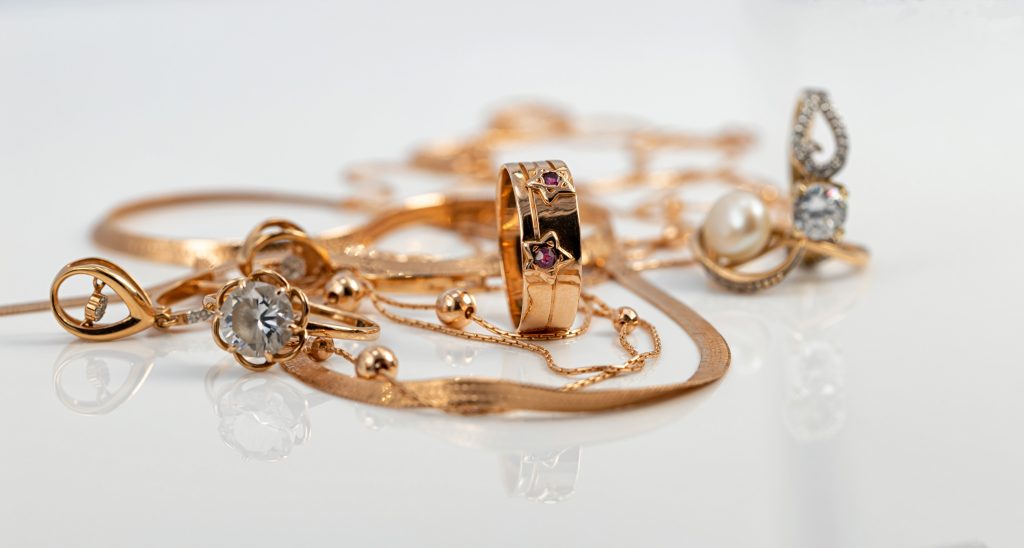The Differences Between Selling Gold Jewelry vs. Diamond Jewelry
When it comes to parting with valuable jewelry, many people wonder about the differences between selling gold jewelry and diamonds. After all, both gold and diamonds hold significant value, but the process of selling each, as well as the resale value, can vary greatly. Whether you’re looking to sell precious metals or diamonds, understanding these differences will help you maximize your returns and navigate the selling process with confidence – and that’s what we’re all about here at Stewart Kuper Jewelers. In this blog, we’ll explore the key differences in selling gold and diamonds, from pricing factors to market demand, and offer useful tips to ensure you get the best deal.
1. The Resale Value of Gold vs. Diamonds
One of the most important considerations when selling jewelry is the resale value. Gold and diamonds are both highly sought after, but their value on the resale market differs considerably.
Gold Resale Value
Gold’s value is largely determined by its weight and purity (measured in karats). Gold is a universally recognized commodity, and its market price is constantly updated based on global supply and demand. This means that when you sell gold jewelry, you can easily check the current gold prices and have a clear understanding of how much your jewelry is worth.
Additionally, the resale value of gold is generally stable and predictable. Regardless of the form—whether in the shape of coins, bars, or jewelry—gold’s intrinsic value as a precious metal means you can usually recoup a significant percentage of its market price when selling.
Diamond Resale Value
Diamonds, on the other hand, do not have a standardized market price like gold. The resale value of diamonds is determined by several factors, including the Four Cs (cut, color, clarity, and carat weight) and the market demand for certain shapes and sizes. Because of this, selling diamonds is more complex, and their resale value can be more variable.
2. Selling Precious Metals vs. Selling Diamonds
Selling Gold Jewelry
The process of selling gold jewelry is relatively straightforward. Buyers will typically weigh your gold and test its purity to determine its value based on the current gold price. The condition of the jewelry itself (such as design or wear) often has little impact on the resale price, as most buyers are focused on the metal content.
Because gold is melted down, selling gold jewelry to jewelers and gold buyers is usually quick and simple. The transparency of the gold market allows sellers to easily compare offers and choose the buyer offering the most competitive price.
Selling Diamond Jewelry
Selling diamonds, however, requires a more detailed evaluation. Unlike gold, where weight and purity are the main factors, diamonds are valued based on many individual characteristics. A diamond’s cut, clarity, color, and carat weight all play crucial roles in determining its resale value. Certifications from reputable gemological institutes, like the Gemological Institute of America (GIA), are also essential for fetching a higher price in the resale market.
Selling diamonds often involves working with a jeweler, diamond dealer, or a specialized online platform. This process can take more time, as the diamond must be carefully inspected and appraised before offers are made. Sellers should be aware that offers can vary widely depending on the buyer’s specific inventory needs and market conditions.
3. Market Demand for Gold vs. Diamonds
Gold
Gold is highly liquid, meaning that there is always a demand for it in the marketplace. Whether economic conditions are stable or uncertain, gold remains a sought-after commodity due to its use in jewelry electronics and as an investment hedge against inflation. This constant demand contributes to the ease of selling gold and generally ensures a good return on investment.
Diamonds
Diamonds, while valuable, do not enjoy the same constant market demand as gold. The resale market for diamonds is much smaller, and certain types of diamonds (like unique shapes or specific carat weights) can be harder to sell. Additionally, fashion trends and consumer preferences often dictate the market demand for diamonds. For example, round brilliant diamonds may be in higher demand than fancy-cut stones, or buyers may be more interested in larger diamonds over smaller ones.
This fluctuation in demand can result in diamonds taking longer to sell or fetching lower offers than anticipated.
4. Key Tips for Selling Gold and Diamonds
Gold Selling Tips
- Check the Current Price of Gold: The price of gold fluctuates daily, so it’s essential to stay informed about current market trends.
- Know Your Gold’s Purity: Be aware of your gold jewelry’s karat (purity) to have a clearer understanding of its value.
- Shop Around: Always get multiple quotes from different buyers, including jewelers, pawn shops, and gold buyers.
Diamond Selling Tips:
- Get Your Diamond Graded: Having a diamond certification from a reputable institute (like GIA) will help verify its value and attract higher offers.
- Understand the Four Cs: Knowing the specifics of your diamond’s cut, clarity, color, and carat weight is essential when negotiating a fair price.
- Be Patient: Finding the right buyer for a diamond can take time. Don’t rush the process and be willing to compare offers from multiple sources.
When it comes to selling gold jewelry vs. diamonds, the differences lie in the valuation process, market demand, and resale value. Gold offers a more straightforward selling experience with transparent pricing and high liquidity. Diamonds, on the other hand, require more in-depth evaluation and may not always fetch the price you expect.
Understanding these differences will help you make the best decision when selling your precious jewelry, ensuring you receive the most value for your items. Another option? Work with a reputable jeweler like Stewart Kuper! Find out more about how a reputable jeweler can help you get the most out of your unwanted gold and diamonds. Give us a call today and schedule your appointment with Stewart to get a true valuation for your unloved gold and diamonds.



